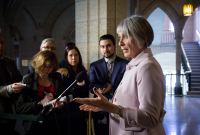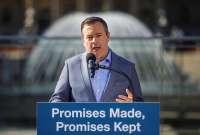Support strong Canadian climate journalism for 2025
A group with roots in the oil and gas industry is encouraging women to talk about politics this fall, even if they hold widely different views.
The non-profit organization, called Canada Powered by Women, registered as a third-party advertiser with Elections Canada last month,and has received $32,500 in contributions from several Calgary-based people and businesses so far. That includes $25,000 from Susan Riddell Rose, the CEO of Perpetual Energy Inc., a natural-gas company.
Lucy Miller, a former head of the United Way of Calgary, said the idea for the group began when some women got together over the summer and started talking about the Oct. 21 election.
"They came together because they were concerned about what's been happening in the country over the last four years," said Miller, the spokeswoman for the group, who noted the carbon tax brought in by the Liberal government Justin Trudeau was one of the shared concerns.
"We had our own personal things that we were looking at, but then we started to say, 'I wonder how the rest of Canada is feeling? What are other women thinking?' " she said. "Maybe this conversation should be bigger."
The organization is launching its campaign in Calgary next week, encouraging women to take part in an online conversation by following the hashtag #canadapoweredbywomen, promoted by a similarly named Instagram profile.
That account, which had about 2,100 followers as of Tuesday evening, has already begun posting things like tips for how to consume political news, a question asking women to share what their ideal lives would look like in four years, and images of both Trudeau and Conservative Leader Andrew Scheer with their families on the first day of school.
The group will also be releasing a report it commissioned from Leger Research, which suggests women are lagging behind men when it comes to how confident they feel talking about important issues in social settings, or trusting their own judgment when it comes to casting their votes.
Miller, who sits on the board of directors at Tourmaline Oil Corp., made it clear that the environment — and the ways in which she disagrees with how the Liberal government has been handling the file — is an issue that is important to those who started the group.
She said she does not think it was a good idea to ban oil-tanker traffic on the northern B.C. coast, wants to see Trudeau do more to push the construction of pipelines and would like to see Canadian oil and gas promoted as a comparatively clean source of energy around the world.
Canadian voters are thinking about climate change and the environment more than ever before, according to most public opinion polls, with scientific findings and personal experiences with extreme weather-related events bringing the issue to the fore.
Still, Elections Canada warned some environmental advocacy groups this summer that any paid communications about the truth of climate change could be considered a partisan issue once the election is called, because Maxime Bernier, the leader of the People's Party of Canada, is promoting a platform that denies climate change is caused by human activity.
The Canada Elections Act restricts third-party advertising during campaigns, affecting any ads about issues that any political party brings up once the election is called.
The rules do not prevent third parties from talking about the issues, but if they spend more than $500 on an ad then they have to register as a third-party advertiser trying to influence how people vote.
Miller said the women behind the registered third-party group did not create it to push their own agenda.
"Everybody has their own issues, and we want them to share their issues, so we don't want it to be all about us," she said.
"Mostly, we want women to be involved," she said. "We want them to feel they have a safe platform to discuss things that are important to them, without being judged."





Comments
Hmmm...well they hit some of the right notes but that underlying background roar from the fossil fuel industry is certainly a distraction. As for the question about where I'll be in four years? Well, at my age I'm hoping to be still topside, walking around, with my brain still producing electrical connections and my powers of analysis and detecting muddled thinking still operational. Also, at my age, I'm long past the fear of speaking up, even if no one listens to just another little old dried up female. Since I'm partially deaf, I'm happy to respond in kind - I can't hear most of what politicians say - but I can still judge them by what they do and don't do!
I probably speak for many on here Betsy in saying that are very much listened to and appreciated...yours is a big, articulate voice! Thank you and hopefully we will se many more years of your wisdom!